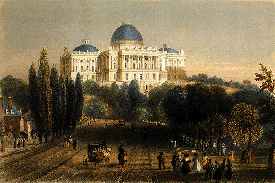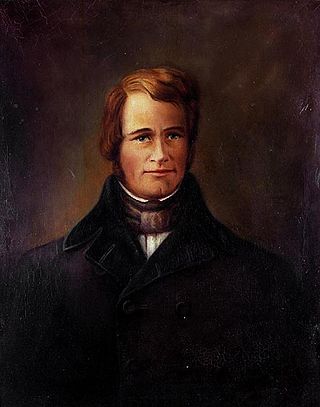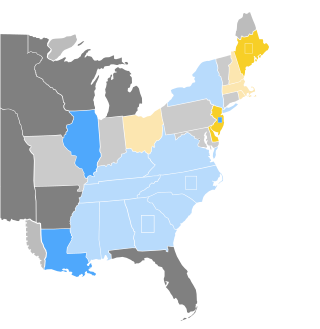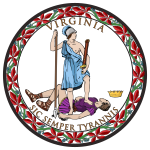
The 21st United States Congress was a meeting of the legislative branch of the United States federal government, consisting of the United States Senate and the United States House of Representatives. It met in Washington, D.C., from March 4, 1829, to March 4, 1831, during the first two years of Andrew Jackson's presidency. The apportionment of seats in the House of Representatives was based on the 1820 United States census. Both chambers had a Jacksonian majority.

Thomas Newton Jr. was an American politician. He was born in Norfolk, Virginia.

Thomas Walker Gilmer was an American statesman. He served in several political positions in Virginia, including election as the 28th Governor of Virginia. Gilmer's final political office was as the 15th Secretary of the Navy, but he died in an accident ten days after assuming that position.

John Sergeant was an American politician who represented Pennsylvania in the United States House of Representatives. He was the National Republican Party's vice presidential nominee in the 1832 presidential election, serving on a ticket with Senator Henry Clay.

The 1828–29 United States House of Representatives elections were held on various dates in various states between July 9, 1828, and October 5, 1829. Each state set its own date for its elections to the House of Representatives before the first session of the 21st United States Congress convened on December 7, 1829. Elections were held for all 213 seats, representing 24 states.

William Segar Archer was a politician, planter and lawyer from Amelia County, Virginia who served several times in the Virginia House of Delegates, as well as in the United States House of Representatives and the United States Senate.

William Creighton Jr. was the 1st Secretary of State of Ohio, a United States representative from Ohio and a United States district judge of the United States District Court for the District of Ohio.
William McCoy was an 18th- and 19th-century politician from Virginia.
John Roane was an eighteenth and nineteenth century politician from Virginia. He was the father of congressman John J. Roane.
Thomas Henry Bayly was a nineteenth-century politician, slave owner, lawyer and judge from Virginia, and the son of Congressman Thomas M. Bayly.
John Taliaferro was a 19th century politician, lawyer and librarian from Virginia, serving several non-consecutive terms in the U.S. House of Representatives in the early 19th century.
Thomas Patrick Moore was a U.S. Representative from Kentucky.

James Harrison Cravens was a U.S. Representative from Indiana, second cousin of James Addison Cravens.
George Loyall was a U.S. Representative from Virginia.

The 1834–35 United States Senate elections were held on various dates in various states. As these U.S. Senate elections were prior to the ratification of the Seventeenth Amendment in 1913, senators were chosen by state legislatures. Senators were elected over a wide range of time throughout 1834 and 1835, and a seat may have been filled months late or remained vacant due to legislative deadlock. In these elections, terms were up for the senators in Class 2.

the 1828–29 United States Senate elections were held on various dates in various states. As these United States Senate elections were prior to the ratification of the 17th Amendment to the United States Constitution in 1913, senators were chosen by State legislature United States. Senators were elected over a wide range of time throughout 1828 and 1829, and a seat may have been filled months late or remained vacant due to legislative deadlock. In these elections, terms were up for the senators in Class 2.

Missouri elected its representative to the United States House of Representatives for the 1828–1830 term on August 4, 1828.

New Jersey elected its members November 4, 1828.

New Hampshire elected its members March 10, 1829 after the term began but before Congress convened.

John Giles was elected August 13, 1829 to the term beginning March 4, 1829, but resigned from the seat without having served.
This page is based on this
Wikipedia article Text is available under the
CC BY-SA 4.0 license; additional terms may apply.
Images, videos and audio are available under their respective licenses.














